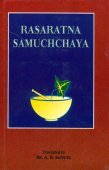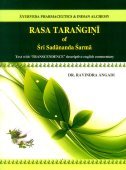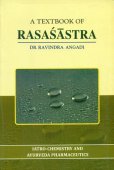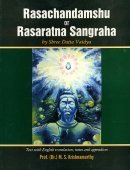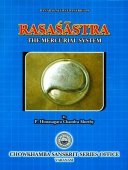Paribhasha, Paribhāsa, Paribhāṣā: 21 definitions
Introduction:
Paribhasha means something in Buddhism, Pali, Hinduism, Sanskrit, Marathi, Jainism, Prakrit, Hindi. If you want to know the exact meaning, history, etymology or English translation of this term then check out the descriptions on this page. Add your comment or reference to a book if you want to contribute to this summary article.
The Sanskrit term Paribhāṣā can be transliterated into English as Paribhasa or Paribhasha, using the IAST transliteration scheme (?).
In Hinduism
Vyakarana (Sanskrit grammar)
Source: Wikisource: A dictionary of Sanskrit grammarParibhāṣā (परिभाषा).—An authoritative statement or dictum, helping (1) the correct interpretation of the rules (sūtras) of grammar, or (2) the removal of conflict between two rules which occur simultaneously in the process of the formation of words, (पदसिद्धि (padasiddhi)), or (3) the formation of correct words. Various definitions of the word परिभाषा (paribhāṣā) are given by commentators, the prominent ones being-परितो व्यापृतां भाषां परिभाषां प्रचक्षते (parito vyāpṛtāṃ bhāṣāṃ paribhāṣāṃ pracakṣate)(न्यास (nyāsa));or, परितो भाष्यते या सा परिभाषा प्रकीर्तिता (parito bhāṣyate yā sā paribhāṣā prakīrtitā). The word is also defined as विधौ नियामक-रिणी परिभाषा (vidhau niyāmaka-riṇī paribhāṣā) (दुर्गसिंहवृत्ति (durgasiṃhavṛtti)). परिभाषा (paribhāṣā) can also be briefiy defined as the convention of a standard author. Purusottamadeva applies the word परिभाषा (paribhāṣā) to the maxims of standard writers, cf. परिभाषा हिं न पाणिनीयानि वचनानि (paribhāṣā hiṃ na pāṇinīyāni vacanāni); Puru. Pari. 119; while Haribhaskara at the end of his treatise परिभाषाभास्कर (paribhāṣābhāskara), states that Vyaadi was the first writer on Paribhaasas. The rules तस्मिन्निति निर्दिष्टे पूर्वस्य, तस्मादित्युत्तरस्य (tasminniti nirdiṣṭe pūrvasya, tasmādityuttarasya) and others are in fact Paribhaasa rules laid down by Panini. For the difference between परिभाषा (paribhāṣā) and अधिकार (adhikāra), see Mahabhasya on II.1.1. Many times the writers of Sutras lay down certain conventions for the proper interpretation of their rules, to which additions are made in course of time according to necessities that arise, by commentators. In the different systems of grammar there are different collections of Paribhasas. In Panini's system, apart from commentaries thereon, there are independent collections of Paribhasas by Vyadi, Bhojadeva, Purusottamadeva, Siradeva, Nilakantha, Haribhaskara, Nagesa and a few others. There are independent collections of Paribhasas in the Katantra, Candra, Sakatayana,Jainendra and Hemacandra systems of grammar. It is a noticeable fact that many Paribhasas are common, with their wordings quite similar or sometimes identical in the different systems. Generally the collections of Paribhasas have got scholiums or commentaries by recognised grammarians, which in their turn have sometimes other glosses or commentaries upon them. The Paribhaasendusekhara of Nagesa is an authoritative work of an outstanding merit in the system of Paninis Grammar, which is commented upon by more than twenty five scholars during the last two or three centuries. The total number of Paribhasas in the diferent systems of grammar may wellnigh exceed 500. See परिभाषासंग्रह (paribhāṣāsaṃgraha).

Vyakarana (व्याकरण, vyākaraṇa) refers to Sanskrit grammar and represents one of the six additional sciences (vedanga) to be studied along with the Vedas. Vyakarana concerns itself with the rules of Sanskrit grammar and linguistic analysis in order to establish the correct context of words and sentences.
Dharmashastra (religious law)
Source: Sacred Texts: The Grihya Sutras, Part 2 (SBE30)Paribhāṣā (परिभाषा) is defined as a general rule or definition applicable throughout a whole system, and more binding than any particular rule. How well this sense of paribhāṣā was understood in India, we may see from a passage in the Śiśupālavadha XVI, 80: “whose (the king’s) command, though brief, having reached the whole kingdom round about and obtained authority, is never defeated, being of the highest weight, like a Paribhāṣā”.
These Paribhāṣās are a very characteristic invention of ancient Indian authors, particularly during the Sūtra period. We find them as early as the Anukramaṇīs, and even at that early time they had been elaborated with many purely technical contrivances.

Dharmashastra (धर्मशास्त्र, dharmaśāstra) contains the instructions (shastra) regarding religious conduct of livelihood (dharma), ceremonies, jurisprudence (study of law) and more. It is categorized as smriti, an important and authoritative selection of books dealing with the Hindu lifestyle.
Ayurveda (science of life)
Source: archive.org: Science And Technology In Medievel India (Ayurveda)Paribhāṣā (परिभाषा) refers to one of the topics dealt with in the Rudradatta, as mentioned in A. Rahman’s Science and Technology in Medievel India: A bibliography of source materials in Sanskrit, Arabic and Persian.—Ancient and medieval India produced a wide range of scientific manuscripts and major contributions lie in the field of medicine, astronomy and mathematics, besides covering encyclopedic glossaries and technical dictionaries.—Paribhāṣā and other topics of the the Rudradatta deal with medicine.

Āyurveda (आयुर्वेद, ayurveda) is a branch of Indian science dealing with medicine, herbalism, taxology, anatomy, surgery, alchemy and related topics. Traditional practice of Āyurveda in ancient India dates back to at least the first millenium BC. Literature is commonly written in Sanskrit using various poetic metres.
General definition (in Hinduism)
Source: Learn Sanskrit: The Structure of the AṣṭādhyāyīParibhāṣā (परिभाषा, “rule of interpretation”).—This sort of rule doesn't address other rules: it addresses the person reading them! Such a rule tells us how we should read and understand the other rules in the Aṣṭādhyāyī.
In Buddhism
Mahayana (major branch of Buddhism)
Source: academia.edu: A Study and Translation of the GaganagañjaparipṛcchāParibhāṣā (परिभाषा) refers to “censure”, according to the Gaganagañjaparipṛcchā: the eighth chapter of the Mahāsaṃnipāta (a collection of Mahāyāna Buddhist Sūtras).—Accordingly, “[...] At that time, sixty koṭis of Bodhisattvas, having stood up from the congregation, joined their palms, paid homage to the Lord, and then uttered these verses in one voice: ‘[...] (195) In order to uphold the true dharma, with patience we will endure the words of abuse, censure (paribhāṣā) and reviling. (196) Upholding this guiding principle, we will endure all these scoffing, threats, decrying, and defaming. [...]’”.

Mahayana (महायान, mahāyāna) is a major branch of Buddhism focusing on the path of a Bodhisattva (spiritual aspirants/ enlightened beings). Extant literature is vast and primarely composed in the Sanskrit language. There are many sūtras of which some of the earliest are the various Prajñāpāramitā sūtras.
Languages of India and abroad
Pali-English dictionary
Source: BuddhaSasana: Concise Pali-English Dictionaryparibhāsa : (m.) abuse; blame; censure.
Source: Sutta: The Pali Text Society's Pali-English DictionaryParibhāsa, (fr. pari+bhāṣ) censure, abuse, blame J. V, 373; PvA. 175. (Page 430)

Pali is the language of the Tipiṭaka, which is the sacred canon of Theravāda Buddhism and contains much of the Buddha’s speech. Closeley related to Sanskrit, both languages are used interchangeably between religions.
Marathi-English dictionary
Source: DDSA: The Molesworth Marathi and English Dictionaryparibhāṣā (परिभाषा).—f (S) A conventional term in a science, a technicality. 2 A list of definitions; or the table of the abbreviations, signs, and marks used in a work: also the introductory chapter; preliminary observations; prolegomena. 3 fig. The first points or principles (as of a business). Ex. kōṇhī ēka vyavahārācī pa0 samajē tōṃ tō vyavahāra kaṭhīṇa vāṭa- tō. 4 In medicine. Prognosis. 5 In grammar. A maxim given as an interpretation of the rules of Panini.
Source: DDSA: The Aryabhusan school dictionary, Marathi-Englishparibhāṣā (परिभाषा).—f A conventional term in a science. The first principles (as of a business).
Marathi is an Indo-European language having over 70 million native speakers people in (predominantly) Maharashtra India. Marathi, like many other Indo-Aryan languages, evolved from early forms of Prakrit, which itself is a subset of Sanskrit, one of the most ancient languages of the world.
Sanskrit dictionary
Source: DDSA: The practical Sanskrit-English dictionaryParibhāṣā (परिभाषा).—
1) Speech, discourse; ग्राम्यवैदग्ध्यया परिभाषया (grāmyavaidagdhyayā paribhāṣayā) Bhāgavata 5.2.17.
2) Censure, reproof, blame, abuse.
3) An explanation.
4) Terminology, technical phraseology, technical terms (used in a work); इति परिभाषाप्रकरणम् (iti paribhāṣāprakaraṇam) Sk.; इको गुणवृद्धीत्यादिका परिभाषा (iko guṇavṛddhītyādikā paribhāṣā) Mbh; cf. also अधिकारशब्देन पारार्थ्यात् परिभाषाप्युच्यते । कश्चित् परिभाषारूप इति (adhikāraśabdena pārārthyāt paribhāṣāpyucyate | kaścit paribhāṣārūpa iti) Kaiyaṭa.
5) (Hence) Any general rule, precept or definition which is applicable throughout (aniyamanivārako nyāya- viśeṣaḥ); परितः प्रमिताक्षरापि सर्वं विषयं प्राप्तवती गता प्रतिष्ठाम् । न खलु प्रतिहन्यते कदाचित् परिभाषेव गरीयसी यदाज्ञा (paritaḥ pramitākṣarāpi sarvaṃ viṣayaṃ prāptavatī gatā pratiṣṭhām | na khalu pratihanyate kadācit paribhāṣeva garīyasī yadājñā) Śiśupālavadha 16.8.
6) A list of abbreviations or signs used in any work.
7) (In gram.) An explanatory Sūtra mixed up with the other Sūtras of Pāṇini, which teaches the method of applying them.
8) (In medicine) Prognosis.
Source: Cologne Digital Sanskrit Dictionaries: Shabda-Sagara Sanskrit-English DictionaryParibhāṣā (परिभाषा).—f.
(-ṣā) 1. A technicality, a conventional term in any science. 2. (In Grammar,) A maxim given by the ancient grammarians as a summary interpretation of the rules of Panini. 3. (In medicine,) Prognosis. 4. Abuse, ridicule. 5. A speech. 6. Censure, blame. E. pari severally, and bhāṣā speech.
Source: Cologne Digital Sanskrit Dictionaries: Benfey Sanskrit-English DictionaryParibhāṣā (परिभाषा).—[pari-bhāṣ + ā], f. 1. Speech, Mahābhārata 13, 7417. 2. A general maxim.
Source: Cologne Digital Sanskrit Dictionaries: Cappeller Sanskrit-English DictionaryParibhāṣā (परिभाषा).—[feminine] the same, a kind of rule ([grammar]).
Source: Cologne Digital Sanskrit Dictionaries: Aufrecht Catalogus Catalogorum1) Paribhāṣā (परिभाषा) as mentioned in Aufrecht’s Catalogus Catalogorum:—[anonymous] Pheh. 14.
2) Paribhāṣā (परिभाषा):—paribhāṣāḥ [grammatical] of the Pāṇinīya school. Io. 1936. W. p. 216. B. 3, 10. Ben. 20. Np. Vi, 70. Bhr. 186. Oppert. 4641. 4704. 4871. 6943. Peters. 3, 392. Bühler 556. See Paribhāṣāvṛtti.
—of the Śākaṭāyana grammar. Bühler 544.
—to the Supadma grammar, by Padmanābhadatta. Io. 802.
3) Paribhāṣā (परिभाषा):—paribhāṣāḥ vaid. Oppert. 4594.
4) Paribhāṣā (परिभाषा):—paribhāṣāḥ [dharma] by Nīlakaṇṭha Bhaṭṭa. Rice. 206.
5) Paribhāṣā (परिभाषा):—paribhāṣāḥ [grammatical] of the Pāṇinīya school. Oudh. Xx, 76. Stein 42.
Source: Cologne Digital Sanskrit Dictionaries: Monier-Williams Sanskrit-English Dictionary1) Paribhāṣā (परिभाषा):—[=pari-bhāṣā] [from pari-bhāṣ] f. speech, discourse, words, [Mahābhārata; Bhāgavata-purāṇa]
2) [v.s. ...] blame, censure, reproof (only [plural]), [Patañjali; Bālarāmāyaṇa]
3) [v.s. ...] any explanatory rule or general definition, (in gram.) a rule or maxim which teaches the proper interpretation or application of other rules, [Pāṇini]
4) [v.s. ...] (in [medicine]) prognosis
5) [v.s. ...] a table or list of abbreviations or signs used in any work
6) [v.s. ...] (also [plural]) Name of sub voce works.
Source: Cologne Digital Sanskrit Dictionaries: Yates Sanskrit-English DictionaryParibhāṣā (परिभाषा):—[pari-bhāṣā] (ṣā) 1. f. Abuse; a technicality; prognosis.
Source: DDSA: Paia-sadda-mahannavo; a comprehensive Prakrit Hindi dictionary (S)Paribhāṣā (परिभाषा) in the Sanskrit language is related to the Prakrit word: Paribhāsā.
[Sanskrit to German]
Sanskrit, also spelled संस्कृतम् (saṃskṛtam), is an ancient language of India commonly seen as the grandmother of the Indo-European language family (even English!). Closely allied with Prakrit and Pali, Sanskrit is more exhaustive in both grammar and terms and has the most extensive collection of literature in the world, greatly surpassing its sister-languages Greek and Latin.
Hindi dictionary
Source: DDSA: A practical Hindi-English dictionaryParibhāṣā (परिभाषा):—(nf) definition; ~[bhāṣāgata/~paraka] definitional; ~[bhāṣita] defined; —[meṃ bāṃdhanā] to define.
...
Prakrit-English dictionary
Source: DDSA: Paia-sadda-mahannavo; a comprehensive Prakrit Hindi dictionary1) Paribhāsa (परिभास) in the Prakrit language is related to the Sanskrit word: Paribhāṣ.
2) Paribhāsā (परिभासा) also relates to the Sanskrit word: Paribhāṣā.
Prakrit is an ancient language closely associated with both Pali and Sanskrit. Jain literature is often composed in this language or sub-dialects, such as the Agamas and their commentaries which are written in Ardhamagadhi and Maharashtri Prakrit. The earliest extant texts can be dated to as early as the 4th century BCE although core portions might be older.
See also (Relevant definitions)
Partial matches: Bhasha, Pari.
Starts with (+17): Paribhasaka, Paribhasati, Paribhasha kalingadeshiya, Paribhashabhashyasutra, Paribhashabhaskara, Paribhashacandrika, Paribhashachandomanjari, Paribhashakrodapattra, Paribhashamanjari, Paribhashana, Paribhashaniya, Paribhashankasutra, Paribhashapatha, Paribhashapradipa, Paribhashapradiparcis, Paribhashaprakarana, Paribhashaprakasha, Paribhashaprakashika, Paribhasharahasya, Paribhasharthamanjari.
Ends with (+38): Advaitaparibhasha, Advaitavedantaparibhasha, Aksharaparibhasha, Antarangaparibhasha, Arthavadgrahanaparibhasha, Ashtaksharaparibhasha, Ashvalayanagrihyaparibhasha, Ashvalayanahomaparibhasha, Asiddhaparibhasha, Bahirangaparibhasha, Bhattaparibhasha, Chandahparibhasha, Chhandahparibhasha, Cikitsaparibhasha, Danaparibhasha, Dharmamimamsaparibhasha, Ganaparibhasha, Gatikarakaparibhasha, Gunatmak-paribhaasha, Gunatmaka-paribhasha.
Full-text (+260): Paribhashaprakasha, Paribhashavritti, Paribhashabhaskara, Paribhashika, Gunatmak-paribhaasha, Laghuparibhashavritti, Paribhashaprakashika, Paribhashapradipa, Paribhashamanjari, Paribhashashiromani, Paribhashasara, Paribhashasutra, Paribhashapradiparcis, Paribhashaviveka, Paribhashasamgraha, Paribhashasegraha, Paribhashaprakarana, Paribhashavishesha, Paribhashakrodapattra, Paribhashatika.
Relevant text
Search found 32 books and stories containing Paribhasha, Paribhāsa, Paribhāṣā, Paribhasa, Pari-bhasha, Pari-bhāṣā, Pari-bhasa, Paribhāsā, Paribhaasha; (plurals include: Paribhashas, Paribhāsas, Paribhāṣās, Paribhasas, bhashas, bhāṣās, bhasas, Paribhāsās, Paribhaashas). You can also click to the full overview containing English textual excerpts. Below are direct links for the most relevant articles:
Apastamba Yajna-paribhasa-sutras (by Hermann Oldenberg)
Vasudevavijaya of Vasudeva (Study) (by Sajitha. A)
Nakṣatramālā of Śivarāma Tripāṭhi < [Chapter 1 - Śāstrakāvyas—A Brief Survey]
Saṃjñā (in Grammar) < [Chapter 3 - Vāsudevavijaya—A Grammatical Study]
Avyayībhāva-samāsa (Compound) < [Chapter 3 - Vāsudevavijaya—A Grammatical Study]
Rasa Jala Nidhi, vol 3: Metals, Gems and other substances (by Bhudeb Mookerjee)
Gobhila-grihya-sutra (by Hermann Oldenberg)
Hiranyakesi-grihya-sutra (by Hermann Oldenberg)
Apastamba Grihya-sutra (by Hermann Oldenberg)
Related products
(+3 more products available)

